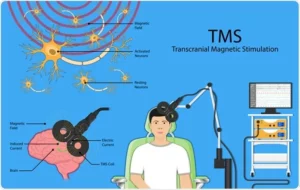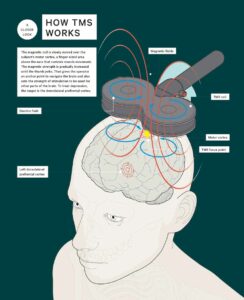Mental health is a critical aspect of overall well-being, and conditions such as depression, anxiety, and other mood disorders can significantly impact a person’s quality of life.
While traditional treatments like medication and therapy have proven effective, they may not be suitable for everyone or may have limited efficacy in some cases. This is where TMS therapy comes into the picture as a potential alternative.
Transcranial Magnetic Stimulation (TMS) therapy is a groundbreaking non-invasive medical procedure that has shown promising results in various mental health conditions.
We will delve into TMS therapy, exploring its benefits, procedure, effectiveness, and how it compares to other treatment options.
So, let’s explore this innovative therapy that offers hope to individuals seeking relief from mental health disorders.
What is TMS Therapy?


TMS therapy involves magnetic fields to stimulate specific areas of the brain. It targets the prefrontal cortex, which is responsible for mood regulation and emotions. By using electromagnetic coils, TMS generates focused magnetic pulses, which, in turn, stimulate nerve cells and enhance communication within the brain.
It got introduced in the 1980s as a research tool for studying brain function. Over the years, advancements in technology and research have led to its application as a therapeutic tool for various neurological and psychiatric disorders.
This non-invasive procedure uses magnetic fields to stimulate specific areas of the brain, and it has shown promising results for patients who have not responded well to traditional treatments like medication and psychotherapy.
At its core, TMS therapy revolves around stimulating specific regions of the brain through the use of electromagnetic coils. These coils are strategically placed on the patient’s scalp, targeting the prefrontal cortex, a part of the brain responsible for mood regulation and emotional processing.
How Does Transcranial Magnetic Stimulation (TMS) Therapy Work?



The TMS therapy procedure typically involves the following steps:
Initial Assessment:
Before beginning TMS treatment, a thorough assessment of the patient’s medical history, mental health condition, and any previous treatment responses is conducted. This evaluation helps determine the suitability of TMS therapy for the individual.
Brain Mapping:
During the initial sessions, the TMS specialist performs brain mapping to precisely identify the target brain areas for stimulation. This personalized approach ensures that the treatment is tailored to the patient’s specific needs.
Treatment Sessions:
The actual TMS treatment consists of multiple sessions, usually conducted over several weeks. Each session lasts around 20 to 30 minutes, and patients can comfortably sit in a chair throughout the procedure. TMS is non-sedative, allowing individuals to resume their daily activities immediately after each session.
Progress Monitoring:
As the treatment progresses, the patient’s response is carefully monitored. Adjustments to the stimulation parameters can be made to optimize the therapy’s effectiveness.
The Benefits of TMS Therapy
Here are the benefits of TMS Therapy:
Non-Invasive and Well-Tolerated:
TMS Therapy is a non-invasive treatment, meaning it does not involve surgery or anesthesia. This makes it a safer option for individuals who may be hesitant about invasive procedures. Moreover, it is generally well-tolerated by patients, resulting in minimal discomfort during the treatment sessions.
Minimal Side Effects:
Compared to other treatment options, TMS Therapy is associated with minimal side effects. The most common side effects reported are mild and temporary, such as slight scalp discomfort or mild headaches. These side effects typically subside shortly after the treatment session.
Enhanced Efficacy:
For individuals who have not experienced significant relief from traditional treatments like medications or psychotherapy, TMS Therapy offers a promising alternative. Studies have shown that TMS can be highly effective, particularly for treatment-resistant conditions like depression.
Improved Quality of Life:
TMS Therapy has the potential to significantly improve the quality of life for individuals suffering from mental health conditions. By targeting specific areas of the brain responsible for mood regulation and emotional processing, TMS can alleviate symptoms and promote a more positive outlook on life.
Non-Systemic Treatment:
Unlike medications that affect the entire body, TMS Therapy targets only the intended brain regions, which reduces the risk of systemic side effects. This localized approach makes TMS a safer and more targeted treatment option.
Outpatient Procedure:
TMS Therapy is typically performed on an outpatient basis. Patients can receive treatment at specialized clinics and return home afterward. There is no need for hospitalization, and individuals can resume their daily activities immediately after each session.
Personalized Treatment:
During the initial stages of TMS Therapy, a process called brain mapping is performed to identify the precise target areas in the brain. This personalized approach ensures that the treatment is tailored to each patient’s specific needs, enhancing its effectiveness.
Long-Lasting Effects:
TMS Therapy has been found to have lasting effects even after the treatment course is completed. Many patients experience prolonged relief from their symptoms, reducing the need for ongoing interventions.
FDA Approved:
TMS Therapy is an FDA-approved treatment for major depressive disorder and certain other mental health conditions. Its approval by a reputable regulatory body speaks to its safety and efficacy.
Adjunct to Other Treatments:
TMS Therapy can also be used as an adjunct to other treatments, complementing existing therapies for better outcomes. It can be integrated into a comprehensive treatment plan to maximize the chances of recovery.
Who Should Consider TMS Therapy?
While TMS has shown promising results in various disorders, not everyone may be a suitable candidate for this therapy.
Let’s explore who should consider TMS Therapy and the factors that determine its appropriateness.
Individuals with Treatment-Resistant Depression:
One of the primary groups that should consider TMS Therapy is individuals suffering from treatment-resistant depression.
TMS therapy may be a great alternative to consider if you have been diagnosed with major depressive disorder (MDD) and have not found significant relief from multiple antidepressant medications or other conventional treatments.
Those Unable to Tolerate Antidepressant Side Effects:
Some individuals may experience intolerable side effects from antidepressant medications, making it challenging to continue their use. TMS Therapy provides a non-pharmacological approach, offering hope to those who cannot tolerate medication side effects.
Patients Seeking Non-Invasive Treatment:
TMS Therapy is a desirable treatment option for people seeking minimally invasive procedures. TMS doesn’t need anesthesia or any incisions, unlike invasive procedures or surgical interventions.
Individuals Who Prefer Targeted Therapy:
TMS therapy targets particular brain regions connected to the patient’s condition. For those who prefer a targeted approach to their health issues, this precise targeting enables customized treatment.
Patients with Other Neuropsychiatric Disorders:
While TMS Therapy is most commonly associated with depression, it has also shown promise in treating other neuropsychiatric disorders such as anxiety disorders, post-traumatic stress disorder (PTSD), and obsessive-compulsive disorder (OCD). Individuals with these conditions may find TMS Therapy to be a potential treatment option.
Individuals Seeking Adjunctive Treatment:
For some patients, TMS Therapy can be used as an adjunctive treatment alongside medications or other therapies. This combined approach may enhance treatment outcomes and improve overall well-being.
Those Willing to Commit to the Treatment Plan:
TMS Therapy typically involves a course of daily sessions over several weeks. Individuals considering TMS should be willing to commit to the treatment plan recommended by their healthcare provider to maximize the potential benefits.
Candidates Who Do Not Have Certain Medical Contraindications:
Although TMS Therapy is generally safe, there are specific medical contraindications that may exclude individuals from undergoing the treatment. People with implanted metallic devices in the head or individuals with certain neurological conditions may not be suitable candidates for TMS.
Side effects of transcranial magnetic stimulation
Transcranial Magnetic Stimulation (TMS) is generally considered a safe and well-tolerated treatment option for various mental health conditions. However, as with any medical procedure, there are some potential side effects associated with TMS Therapy.
Here are the common side effects of TMS Therapy:
Scalp Discomfort:
During TMS treatment, some individuals may experience mild discomfort or a sensation of pressure on the scalp at the site where the electromagnetic coil is placed. This discomfort is usually temporary and subsides shortly after the session.
Headache:
A mild headache is another possible side effect of TMS Therapy. It is typically short-lived and can be managed with over-the-counter pain relievers if necessary.
Muscle Twitching:
During the TMS procedure, there may be mild muscle twitching in the face or scalp area. This is a normal reaction to magnetic stimulation and is not a cause for concern.
Lightheadedness:
Some individuals may experience temporary lightheadedness immediately after a TMS session. This sensation usually resolves quickly, and patients are advised to sit or lie down until they feel stable.
Tingling Sensation:
A tingling or prickling sensation on the scalp is another possible side effect of TMS Therapy. Like other side effects, it is transient and typically subsides soon after the treatment.
Hearing Changes:
During TMS sessions, patients may hear clicking sounds generated by the magnetic pulses. In rare cases, these sounds may cause temporary hearing changes, but they are not usually harmful.
Seizures (Rare):
Though extremely rare, TMS Therapy has been associated with the risk of inducing seizures, particularly in individuals with a history of epilepsy or seizure disorders. As a precaution, thorough screening is conducted before starting TMS treatment to identify individuals at higher risk for seizures.
Conclusion
Transcranial Magnetic Stimulation (TMS) Therapy represents a significant breakthrough in the field of neuroscience, offering hope to individuals with treatment-resistant neurological and psychiatric disorders.
This non-invasive and well-tolerated treatment has shown promise in treating depression, anxiety, PTSD, OCD, and other conditions.
As research and technology continue to advance, TMS Therapy’s applications are likely to expand further, providing a ray of hope for countless patients seeking relief from challenging conditions.
If you or a loved one is struggling with a neurological or psychiatric disorder, consider exploring the potential benefits of TMS Therapy with the guidance of a qualified healthcare professional.
FAQs on TMS Therapy:
Q: Is TMS Therapy Painful?
A: TMS Therapy is generally well-tolerated and non-painful. Some patients may experience mild discomfort or a tapping sensation on the scalp during the session, but it is not painful.
Q: How Long Does TMS Therapy Take to Work?
A: The timeline for improvement with TMS Therapy varies from person to person. Some individuals may experience positive effects within the first few weeks, while others may require more extended treatment before noticing significant changes.
Q: Are There Any Long-Term Side Effects of TMS Therapy?
A: TMS Therapy’s long-term side effects are minimal, and the procedure is generally safe. There is no evidence to suggest that TMS causes any lasting harm to the brain.
Q: Can TMS Therapy Be Used Alongside Medications?
A: Yes, TMS Therapy can be used alongside medications for various neurological and psychiatric conditions. However, it is essential to discuss all current medications with the healthcare provider before starting TMS treatment.
Q: Are There Any Contraindications for TMS Therapy?
A: While TMS Therapy is generally safe, it may not be suitable for individuals with certain medical conditions or implanted metallic devices in the head. A comprehensive medical evaluation is necessary before undergoing TMS treatment.